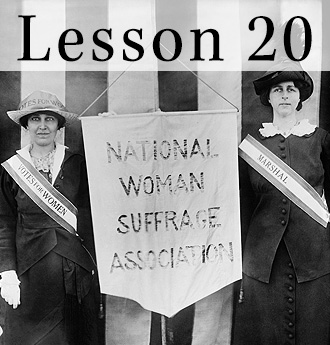The Resource Center » Level 3 » Unit 3 »
Lesson 20: How Has the Right to Vote Been Expanded since the Adoption of the Constitution?

Lesson Purpose
Lesson Objectives
- describe the extension of the franchise as a result of changes in voting laws in Congress and various states, amendments to the Constitution, and decisions of the Supreme Court and
- evaluate, take, and defend positions on how extending the right to vote is related to fundamental ideas and principles of American constitutional government.
Lesson Terms
Lesson Biographies
Lesson Court Cases
Lesson Primary Sources
Alabama's Literacy Test in 1965. Such tests were used as a requirement to register to vote until restrictions in the Voting Rights Act of 1965 made them all but illegal. They were used to deny voting rights primarily to African Americans, who had limited access to quality education.






